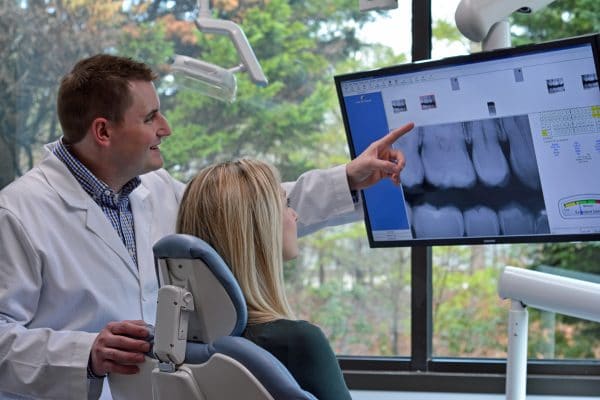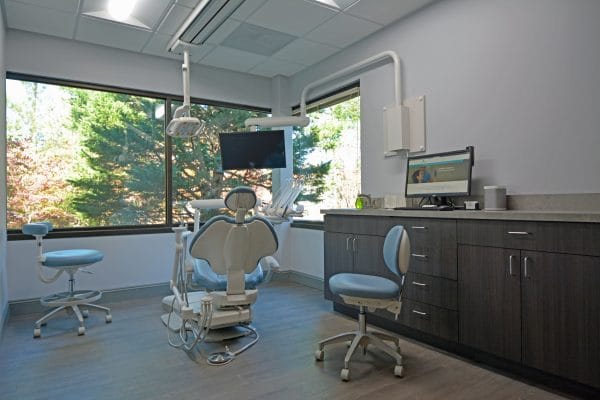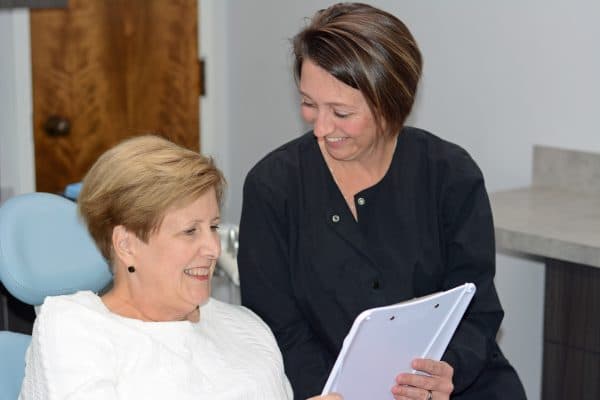Dentures Chapel Hill
fall in love with your smile
Full & Partial Dentures for Teeth Replacement
Full or partial dentures are often suggested for individuals who are missing portions or all of their teeth. Patients who are missing some or all of their teeth can often develop feelings of self-consciousness about their smile. For patients struggling with these feelings, full or partial dentures may provide the solution you are looking for.
In addition to improving the look of your smile, dentures also serve several functional purposes that will improve your overall oral health, including improving the functionality of your mouth and your ability to chew, and protecting gums that would otherwise be exposed. There are a range of styles and types of dentures, but the two primary categories are full sets, which are used for patients who are missing all of their teeth, or partial sets, which are used when one or more teeth are still present in either the upper or lower jaw.
Patients who meet the following criteria may be ideal candidates for dentures:
- Majority of natural teeth are missing
- Jawbone has deteriorated to the point where dental implants are not a viable option
- Decay is significant enough to require tooth extraction
- Receding gums due to disease or age
If you would like to schedule an appointment or if you have any questions about our treatment options, please contact our office at (919) 595-1010. We look forward to creating the smile you have always desired a reality for you.
Steps & Timeframe for Dentures
The process for having dentures placed will begin with an initial consultation, during which your dentist will take X-rays and review your medical and dental history to ensure that dentures are appropriate for you.
There are a range of types and styles of dentures, but the process for having dentures fitted will generally follow these steps:
- An impression will be made of your gums and remaining teeth to ensure that the dentures will fit securely and comfortably. If you have teeth that require an extraction, it will be necessary to perform this extraction and allow for the gums to heal before taking this impression.
- Next, your dentist will use wax rims to measure your bite.
- Your teeth will be customized to ensure they are the desired shade, size, and shape. It is important to talk to your dentist about your aesthetic preferences so you can achieve the smile you want. Once this information is collected, it will be sent to a lab where the dentures will be designed.
- Your dentist will provide a mock-up set of dentures to ensure the fit is correct. This will also give you an opportunity to get used to wearing dentures.
- Once you are comfortable with the mock-up, your dentures will be designed. Once complete, you will return for a final fitting, during which any final adjustments can be made
- In addition to your regular dental examinations, it is important to schedule check-up appointments, especially if your dentures every begin to feel uncomfortable.
Adjusting to Your Dentures
Because dentures are not a surgical procedure, it is generally a painless process to have them fitted. Once fitted, patients do often report that their upper dentures feel tight, whereas the lower dentures are more likely to feel loose. If you are experiencing any issues related to your dentures, schedule an appointment for an adjustment.
One of the most important things to be mindful of is the importance of wearing your dentures every day. It is common for people to experience frustration or feelings of self-consciousness immediately after having dentures placed, as new dentures can change the feeling of chewing, as well your physical appearance. Speaking can also be initially more difficult, but if you are having these feelings, try to be patient and remember that dentures will continue to feel more and more like your natural teeth the longer you wear them.
Proper Care Improves Longevity of the Full and Partial Dentures
In addition to scheduling adjustments when necessary, one of the best ways to prevent issues related to dentures from developing is taking proper care of them. To follow good oral care for your dentures, be sure to follow these best practices:
- Remove your dentures after eating
- Rinse your dentures with water after eating
- Be careful handling your dentures, especially when you are cleaning them
- After removing your dentures, clean your remaining teeth (if applicable) tongue, palate, and cheeks with a soft-bristled toothbrush
- Brush your dentures daily
- Soak your dentures each night
- Rinse your dentures before putting back in your mouth
In addition to following these best practices, it is important that you continue to schedule regular dental exams. Unchecked dental issues can result in additional issues and progression of decay, which is why it is so important to visit your dentist every six months.
In addition to providing a professional cleaning for your dentures and diagnosing potential issues before they progress, these regular checkups also allow your dentist to monitor the status of your dentures and make any necessary adjustments to ensure that you can avoid discomfort or slippage. Although it is generally considered best practice to visit your dentist every six months, do not hesitate to schedule an appointment if your dentures are causing you irritation or feel too loose.





High-Quality Dental Care
At Cornerstone Family Dentistry in Chapel Hill, all our services are performed with the patient in mind. We want you to feel comfortable in the dental chair, confident in our work, and most importantly, we want you to fall in love with your smile again. If you would like to schedule an appointment or if you have any questions about cosmetic procedures that we offer, please contact us at (919) 595-1010.
